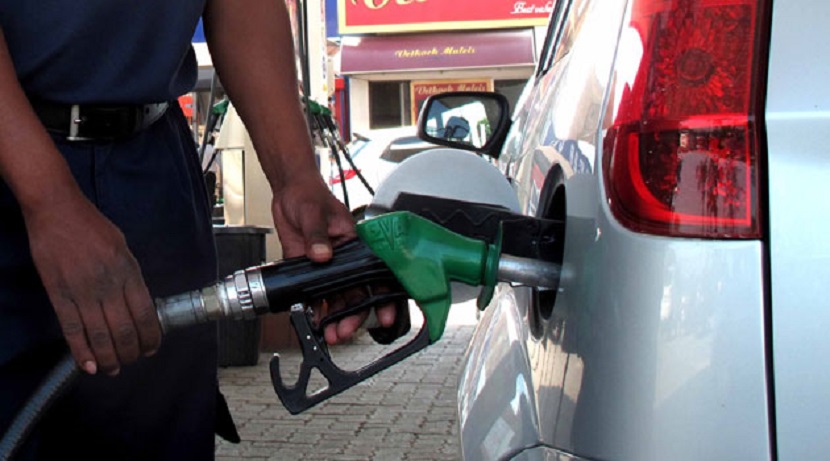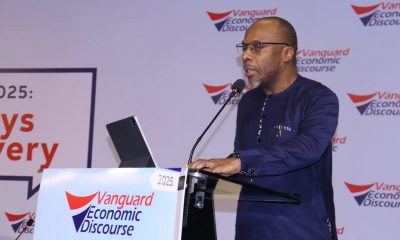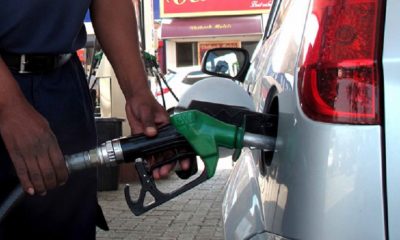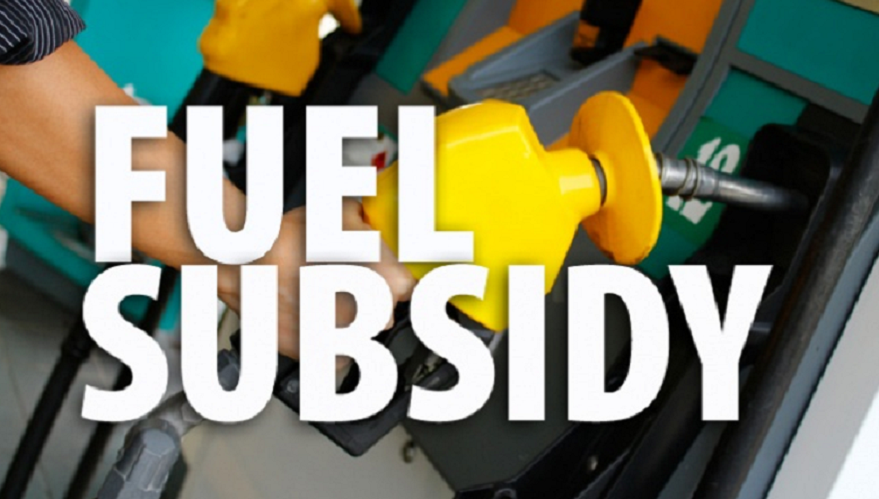General
Fuel Subsidy Removal and the Concept of Change

By Jerome-Mario Utomi
It is common knowledge that the Nigeria Labour Congress (NLC) recently rejected the federal government’s proposed N5,000 for 40 million poor Nigerians when the subsidy on Premium Motor Spirit (PMS), commonly called petrol, is removed.
While describing it as ‘nonsensical’ the argument that the complete surrender of the price of petrol to market forces would normalize the curve of demand and supply as it is being wrongly attributed to the current market realities with cooking gas, diesel and kerosene are very obtuse, the union, according to media reports, warned that the bait by the government to pay 40 million Nigerians N5,000 as a palliative to cushion the effect of the astronomical increase in the price of petrol, is comical.
Essentially, before going ahead to admit the fact that the NLC captured what has been on the minds of Nigerians, there is a need that I add context to the present discourse.
It is public knowledge that prior to the 2015 general election when the word ‘change’ made its way to the nation’s leadership lexicon via our political leaders, who at that time, in the image of their actions, and in their quest for new but personal fields to increase their wealth and wellbeing, redefine the word and lavishly promised Nigerians same, Nigerians have never paid ‘disciplined attention’ to, or hobnobbed/romanced such a word.
Also lamentable is the awareness that without studying the various propositions presented by the change proponents, and failures by well-informed citizens to inform the masses accordingly, politicians persuaded Nigerians to endorse and applaud the lavishly promised ‘change’ without knowing or recognition that it was harmful to their interest.
With the above highlighted and in order not to allow the true meaning/obligation of change in any given society, state or nation, to go with political winds, this piece will further keep issues where they are.
Globally, the concept of change has been a subject of metaphysical discourse and dispute.
As noted by an author, the notion of change is always related to being, the relationship of being and becoming in infinite beings. Whatever change is and is not, it has a past, a present and a future. Change as it were, is a self-evident fact; we experience change.
Hence we can say for certain that change is the primary datum of experience. Everything given to experience is subject to change. Hence, change is a universal phenomenon. Change involves movement from one pole to another. It is a transition of being from one mode of being to another mode of being. To change implies to be different and yet somehow to remain the same. That is, the past mode and the present mode are somehow different and somehow the same.
Second and very fundamental, like so many unpalatable experiences in the past (electricity tariff among others), this piece holds the opinion that engineering change is not the problem but how the government defines/understands the concept of change. This understanding daily reflects in the federal government choices and slanted decisions that today paints our nation with the politics of fear and bankruptcy of ideology, perpetuates poverty and promotes powerlessness, impedes socio-economic development, leaves our democracy down-graded and troubled; visits Nigerians with tears while eroding opportunities for sound policy formulation.
More importantly, aside from the fact that the planned fuel subsidy removal has recently seen the relationship between the government and the governed transcends to a chaotic coexistence, leaving Nigerians as both victims of blasted hope, there are of course more reasons why Nigerians are not particularly happy with such development and can no longer trust the social contract or the framework of rules that governs the state.
Here is my philosophy; recently, life in the estimation of Nigerians who once lived in comfort and loved to stay alive, has become not only a burden but the shout of the ‘good old days’ now rends the nations’ wavelength with the cost of living comparatively high and national security now a problem, our value system which used to be sound has gradually been eroded and people no longer have value for hard work and honesty.
The country is currently the direct opposite of what it used to be. There is uncertainty and collective fears of the future, stemming from state weakness, clientele and indiscriminate repression which have resulted in the emergence of armed responses by marginalized groups and nationalist, ethnic or other populist ideologies.
The situation says something more. Across the board, there exist political and institutional factors: weak state institutions, elite power struggles and political exclusion, breakdown in social contract and corruption, identity politics. Socioeconomic factors such as inequality, exclusion and marginalization, absence or weakening of social cohesion, poverty among others.
Most importantly, with the promised change by the present administration; Nigerians thought that they (FG) will make conscious efforts to enhance primary health care facilities across the country, reduce costs and unnecessary pressure on secondary/tertiary health care facilities.
Personally, I have personally thought that the promised change in 2015 would increase the number of, and improve the quality of all federal government-owned hospitals to world-class standards within five years.
In the area of education, Nigerians are particularly not happy that the present Federal Government is unable to carry out a thorough review of the education sector and tackle the main causes of the sectors’ decline, implement fully and enforce the provisions of the Universal Basic Education Act with emphasis on gender equity in primary and secondary school enrolment while also improving the quality and substance of the schools.
Without a doubt, Nigerians had earlier believed that the present administration would reinstate the now abandoned Teacher Training College to train teachers, make substantial investments in training programmes at all levels of the educational system, re-introduce technical and vocational education nationwide by giving adequate material support to such institutions. They (Nigerians) expected the APC led administration to spend up to the UNESCO budgetary recommendation on the education sector.
Whatever may be the failures, this piece believes that we must as a nation return to where it started from. This is because, despite the validity of the federal government’s present argument, nobody will believe them particularly as Mr President had during a media broadcast on October 1, 2020, insisted that petroleum prices in Nigeria must be adjusted as it makes no sense for oil to be cheaper in Nigeria than in Saudi Arabia.
Let’s again listen to that remark; we sell now at N161 per litre. A comparison with our neighbours will illustrate the point; Chad which is an oil-producing country charges N362 per litre; Niger, also an oil-producing country sells 1 litre at N346; In Ghana, another oil-producing country, the petroleum pump price is N326 per litre; Further afield, Egypt charges N211 per litre. Saudi Arabia charges N168 per litre. It makes no sense for oil to be cheaper in Nigeria than in Saudi Arabia, Buhari concluded.
No nation, in my view, can become great under a leadership arrangement with such orientation/thinking.
Jerome-Mario Utomi, Programme Coordinator (Media and Public Policy), Social and Economic Justice Advocacy (SEJA), writes from Lagos. He could be reached via je*********@***oo.com or 08032725374.
General
INEC Shifts 2027 Presidential, N’Assembly Elections to January 16

By Adedapo Adesanya
Nigeria will hold next year’s presidential and National Assembly elections a month earlier than planned, after the Independent National Electoral Commission (INEC) revised the polling schedule.
The elections will be held on January 16, instead of the previously announced date of February 20, INEC said in an X post, signed by Mr Mohammed Kudu Haruna, National Commissioner and Chairman, Information and Voter Education Committee.
There were also changes to the Governorship and State Houses of Assembly elections initially fixed for Saturday, March 6 2027, in line with the Electoral Act, 2022, have now been moved to Saturday, February 6, 2027.
The electoral commission said the changes were caused by the enactment of the Electoral Act, 2026 and the repeal of the Electoral Act, 2022, which introduced adjustments to statutory timelines governing pre-election and electoral activities.
“The Commission reviewed and realigned the schedule to ensure compliance with the new legal framework,” it said.
INEC said party primaries (including resolution of disputes) will commence on April 23, 2026 and end on May 30, 2026, after which Presidential and National Assembly campaigns will begin on August 19, 2026, while Governorship and State Houses of Assembly campaigns will begin on September 9, 2026.
It noted that campaigns will end 24 hours before Election Day, and political parties have been advised to strictly adhere to the timelines.
INEC also stated it will enforce compliance with the law.
The electoral body also rescheduled the Osun Governorship election which was earlier scheduled for Saturday, August 8 2026, by a week to Saturday, August 15, 2026.
INEC noted that some activities regarding the Ekiti and Osun governorship elections have already been conducted, and the remaining activities will be implemented in accordance with the Electoral Act, 2026.
Speaking at a news briefing in Abuja two weeks ago, the chairman of INEC, Mr Joash Amupitan, expressed the readiness of the commission to conduct the polls next year.
The timetable issued by the organisation for the polls at the time came when the federal parliament had yet to transmit the amended electoral bill to President Bola Tinubu for assent.
Later that week, the Senate passed the electoral bill, reducing the notice of elections from 360 days to 180 days, while the transmission of results was mandated with a proviso.
General
NIMASA Rallies Stakeholders’ to Develop National Action Plan

By Adedapo Adesanya
The Nigerian Maritime Administration and Safety Agency (NIMASA) has pledged its commitment to provide the regulatory leadership, technical coordination, and stakeholder engagement required to successfully develop and implement a robust National Action Plan on maritime decarbonization in Nigeria.
The Director General of the agency, Mr Dayo Mobereola, made this known during the National Stakeholders’ workshop on the development of a National Maritime Decarbonization Action Plan, further describing the workshop as a critical step in actualising the Federal Government’s blue economy and climate objectives.
Represented by the Executive Director, Operations, Mr Fatai Taiye Adeyemi, the NIMASA DG underscored the significance of the IMO GreenVoyage2050 Project, a technical cooperation initiative /designed to support developing countries in implementing the IMO GHG Strategy.
According to him, the National Action Plan being developed will reflect national realities, leverage existing capacities, address identified gaps, and align with broader economic and environmental priorities of the federal government.
Mr Mobereola stressed that “this transition is not merely about compliance with international obligations, it is about safeguarding our marine environment, protecting public health, strengthening the blue economy, and ensuring that our maritime industry remains competitive and future-ready”, the DG said.
Also speaking at the event was the Technical Manager of the IMO GreenVoyage2050 Project, Ms Astrid Dispert, who highlighted that the overarching objective of the initiative is to advance a coherent and globally aligned regulatory framework to accelerate maritime decarbonization.
She also emphasised that NIMASA plays a pivotal role in driving the project at the national level.
The IMO GreenVoyage2050 Project provides technical expertise and institutional support to assist countries in developing and implementing National Action Plans that promote sustainable shipping practices, encourage investment in clean technologies, and strengthen capacity for long-term emissions reduction.
Through this collaboration, the federal government is advancing deliberate steps towards maritime decarbonization, reinforcing its commitment to global climate goals and ensuring a cleaner, greener, and more sustainable future for the sector.
General
BPP Mandates Digital Submission for MDAs From March 1

By Adedapo Adesanya
The Bureau of Public Procurement (BPP) has directed all Ministries, Departments and Agencies (MDAs) to comply with its digital submission process effective March 1.
The directive was contained in a circular signed by the Director-General of the Bureau, Mr Adebowale Adedokun, noting that the move was part of the bureau’s commitment to digital transformation and paperless governance.
It explained that the transition followed an earlier circular of Aug. 4, 2025, which introduced electronic submission procedures.
According to the bureau, it has successfully moved from physical filings to a dedicated e-mail service for document submissions and is now advancing to a more robust and integrated system.
The circular announced the inauguration of the BPP Digital Submission Portal, a web-based platform designed to enable MDAs submit procurement-related documents directly to the Bureau.
It stated that the automated platform would streamline the submission process, enhance transparency and ensure accelerated tracking of procurement-related documents and petitions.
“With effect from March 1, all MDAs will be required to use the portal to submit requests for ‘No Objection’ Certificates, approvals for ‘No Objection’ for special procurements, clarifications and status updates on submissions,” the bureau said.
It added that the portal would be hosted on the Bureau’s official website and would become fully operational from the effective date.
The bureau warned that physical submissions or manual hand-deliveries would no longer be prioritised and would eventually be rejected following the full transition to the digital platform.
It urged accounting officers to brief their procurement departments and ICT units on the development to ensure seamless processing of procurement activities from March 1.
It further advised MDAs to contact the Bureau via its official email for information on the onboarding process and integration into the portal.
The bureau emphasised that full compliance by all MDAs was required to ensure a smooth transition and avoid delays in the implementation of the 2026 fiscal year procurement processes.
-

 Feature/OPED6 years ago
Feature/OPED6 years agoDavos was Different this year
-
Travel/Tourism10 years ago
Lagos Seals Western Lodge Hotel In Ikorodu
-

 Showbiz3 years ago
Showbiz3 years agoEstranged Lover Releases Videos of Empress Njamah Bathing
-

 Banking8 years ago
Banking8 years agoSort Codes of GTBank Branches in Nigeria
-

 Economy3 years ago
Economy3 years agoSubsidy Removal: CNG at N130 Per Litre Cheaper Than Petrol—IPMAN
-

 Banking3 years ago
Banking3 years agoSort Codes of UBA Branches in Nigeria
-

 Banking3 years ago
Banking3 years agoFirst Bank Announces Planned Downtime
-

 Sports3 years ago
Sports3 years agoHighest Paid Nigerian Footballer – How Much Do Nigerian Footballers Earn























